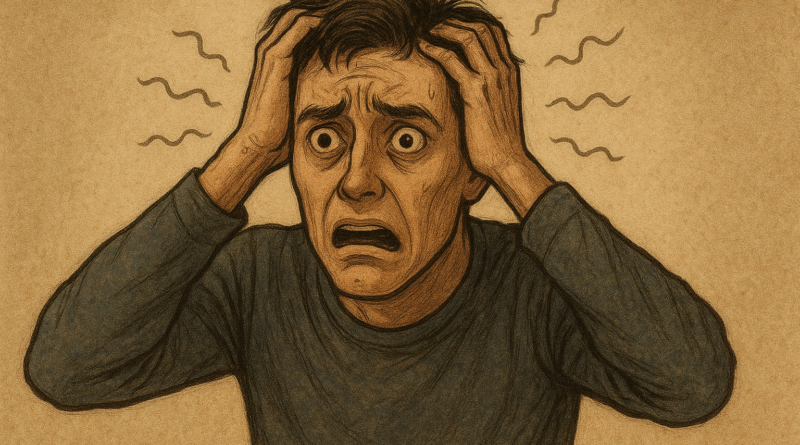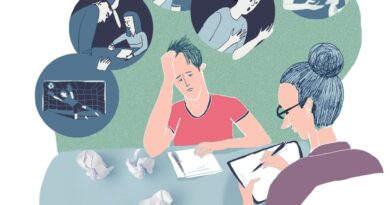How the Fear of Losing Control Fuels Anxiety Disorders
How the Fear of Losing Control Fuels Anxiety Disorders
There is a kind of fear that gives chills, no trigger, no warning, just the feeling that your grip is slipping, that you could lose control of your mind, your body. That’s one of the scariest parts of anxiety. You are experiencing one of the most common roots of the fear of losing control.
For a lot of people, anxiety is not simple overthinking. Sometimes it’s the unnerving sense that something inside you is losing your control, like that you are trying to hold yourself but can not manage it. I have felt that quiet with one racing thought and skipped the heartbeat, and suddenly your mind feels like it’s screaming when everything is fine but you feel fears.
The Psychology Behind Control
Why does control matter so deeply?
Because control feels like safety. From an early age we are taught that we can just plan, and we can avoid getting hurt. but life is unpredictable, and when it does not, our brains start to treat it like danger.
That’s where the fear of losing control started. It is not really about dominance; it’s about staying safe in the world that once proved dangerous. For some it grows from past trauma, from the moment when you lose your loved one and are out of control; that fear always stays inside you. For others, it’s tied to precision, and every mistake feels like everything falling apart.
When anxiety takes over, the line between actual danger and imagined threats starts. Your body reacts in survival mode with a fast heartbeat and muscle problems if the only thing you’re fighting is your own thoughts.
Understanding the Fear of Losing Control
The fear of losing control in many anxiety disorders lies in one powerful core. It shows up in the panic attack and generalized anxiety or obsessive thoughts; the fear remains the same. It’s the worry that might break you inside.
When this fear takes over, everything becomes a turn in your mind against you and your breathing, your heartbeat, and even your thoughts. The question you start asking yourself is, What if I can not handle this? What if I go crazy? What if I make a fool of myself? what if is where the anxiety lives.
Science tells us some truth: Your brain’s alarm system. When you start fearing losing control, your brain remembers the mistakes that fear of real danger made, and your body reacts as if you are in fear; you start sweating, your heart rate quickens, and your hands shake. And the more you try to calm it down, the louder it becomes.
A Personal Experience: When My Mind Wouldn’t Stop
I remember one night, sitting on my bed, feeling like my mind was rolling faster than my body could handle. My heart beats fast. My breathing became low. I was not in danger—but I felt like I was. That was the first time I realized how powerful the fear of losing control may be.
It was not about passing; it was about losing myself. Losing control meant losing safety. The thought alone made the anxiety intense. My doctor later told me it was a panic attack—something many people experience without learning why.
For months, I avoided social groups, flights, and even driving. The idea of losing control in public scared me. That’s when I understood how anxiety disorders feed on this fear—they create a cycle that needs you inside your own mind.
The Link Between Control and Anxiety
The fear of losing control does not just cause anxiety; it supports it. Every time you fear your body’s response—your heartbeat, your breathing, your dizziness—you tell your brain that it is danger. Your brain listens.
This cycle looks like this:
- A Trigger: A thought, feeling, or touch sparks fear.
- Perceived Loss of Control—You panic, thinking you can not stop it.
- Physical Symptoms—Your heart rate is fast, you sweat, and you shake.
- Fear grows: You focus more on side effects, increasing panic.
- Avoidance Behavior: You start avoiding cases that might trigger it.
Soon, the fear of losing control becomes your mind base option state. Even minor stress feels like a calamity. You start planning every detail of your life just to feel safe—and when things go off-plan, anxiety floods in again.
The Role of Medication: Ambien and Xanax
For many people, therapy alone is not enoug and that where medications like Ambien and Xanax can help.
- Ambien (Zolpidem) is often prescribed to help people with anxiety-problem insomnia. When your body has not had proper sleep for weeks, your brain becomes more affected by fear and stress. Ambien helps you reset your sleep cycle, giving your mind a break from the chronic panic.
- Xanax (Alprazolam), on the other hand, is a fast-acting anxiety medication that affects the GABA receptors in your brain, helping calm active nerves. It’s especially useful for acute panic attacks or severe anxiety lessons tied to the fear of losing control.
However, it’s key to note that Ambien and Xanax are not long-term fixes. They can bring relief, but healing anxiety requires handling the root fear—not just detaching it. Cognitive Behavioral Therapy (CBT), mindfulness, and exposure therapy help control your brain to trust itself again.
Ways to Rebuild Self-Trust
Ambien and Xanax provide relief; I have also found comfort with natural ways.
- Exercise: Daily exercise that helps to reduce your anxiety.
- Mindfulness: Focusing on your present moment helps to quiet overthinking of anticipatory anxiety.
- Writing: Write your thoughts and fears that really reduce your stress.
- Support: Sharing experiences with other women reduces anxiety and builds trust.
These practices are mixed with medication or natural support.
The Connection Between Sleep and Control
Anxiety commonly feels weaker at night—when your mind is quiet, but your thoughts are loud. Poor sleep is a problem with the fear of losing control, making you feel more open during the day.
That’s why doctors sometimes prescribe Ambien—to restore the body’s natural remedies. When sleep stabilizes, emotions improve. You think clearly, worry less, and handle doubt better. In a way, rest is your first line of defense against the chaos inside.
Taking Back Your Power
Overcoming the fear of losing control does not mean you all will never feel uneasy again. It means learning that fear does not define you. Control is not about controlling every emotion—it’s about trusting yourself enough to handle anything that comes.
The truth is, you are not true losing control when anxiety hits—you are feeling your body’s careful system doing its job. The problem is not the feeling; it’s the reading. Once you stop fighting it, the fear weakens.
Final Thoughts: Finding Freedom Above Fear
The fear of losing control is one of the most powerful forces behind anxiety disorders. It urges you that your own mind can not be trusted. But healing starts the moment you realize that you can trust yourself—that anxiety is just part of life.
Medications like Ambien and Xanax can help balance the storm, but real peace comes learning that control is not about trust—it’s about confidence. Every breath you take in acceptance of your past mistake and overcome with your fear.
And one day, when anxiety breathes, What if you lose control?” — you all be able to answer, “Then I all breathe through it. Because I know who I am.




